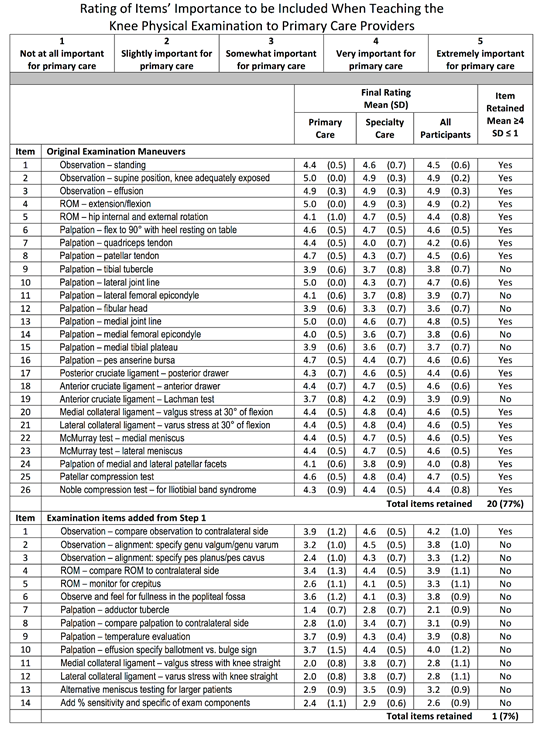Session Information
Date: Sunday, November 5, 2017
Title: Education Poster
Session Type: ACR Poster Session A
Session Time: 9:00AM-11:00AM
Background/Purpose:
Musculoskeletal (MSK) physical exam checklists for a Veterans Affairs (VA) continuing professional development (CPD) course were developed and validated in a broad educational effort for primary care providers (PCPs). These tools were introduced to national leaders in MSK education in the VA National Simulation, Learning, Education and Research Network (SimLEARN) MSK Master Educator course. The aim of this project is to further enhance these through a statistically guided consensus effort.
Methods:
Twenty MSK educators attending the 2017 MSK Master Educator course were invited to participate in a 3-step Delphi process. Step 1 involved review of current versions of the 21-item shoulder and 26-item knee checklists with invitation to suggest additional items. In step 2, each educator rated every item’s importance to be included in a curriculum for PCPs, using a 5-point Likert scale (1 = not at all important; 5 = extremely important). In the 3rd step, educators were given the groups’ average rating for each item, reminded of their own initial rating, and asked to make a final 5-point rating. Individual responses to each step remained anonymous. After the final step, items meeting the predetermined criteria of mean ³4 and standard deviation ≤1 were retained; these items defined the consensus checklists.
Results:
Eighteen educators (90%; 16 physicians, 1 physician assistant, 1 nurse practitioner) completed the project. Nine educators’ practice area was primary care; 9 were in specialty care, of which 7 were rheumatologists.
In step 1, 11 items were added to the shoulder and 14 to the knee checklists. There were no significant differences in ratings from step 2 to step 3, though standard deviations were significantly smaller for both shoulder and knee (p < 0.005) in step 3, after respondents were provided with the groups’ mean ratings from step 2.
Final ratings for the shoulder and knee are listed in the figures below:
When stratifying ratings by practice area, significant differences were seen between ratings by those in primary care and those in specialty care, for both shoulder (p = 0.03) and knee (p = 0.004).
Conclusion:
This is a feasible method for a national group of experts to create statistically guided educational tools. The differences between specialist and primary care educators’ ratings of item importance suggest these groups may have different expectations for CPD programs. These findings should inform future educational initiatives, ensuring that both subject matter experts and those familiar with the clinical duties of target learners are included in consensus projects.
To cite this abstract in AMA style:
Barker A, Brahaj A, Carvalho P, Castiglioni A, Doan D, Gager K, Hansen KE, Hearth-Holmes M, Kim L, Lazzari AA, Lin TF, Olson C, Osting VC, Pearson MM, Rolle NA, Siaton BC, Von Feldt JM, Okuda Y, Battistone MJ. Development of Musculoskeletal Physical Examination Checklists: A Formal Consensus Project Involving National Educators [abstract]. Arthritis Rheumatol. 2017; 69 (suppl 10). https://acrabstracts.org/abstract/development-of-musculoskeletal-physical-examination-checklists-a-formal-consensus-project-involving-national-educators/. Accessed .« Back to 2017 ACR/ARHP Annual Meeting
ACR Meeting Abstracts - https://acrabstracts.org/abstract/development-of-musculoskeletal-physical-examination-checklists-a-formal-consensus-project-involving-national-educators/


